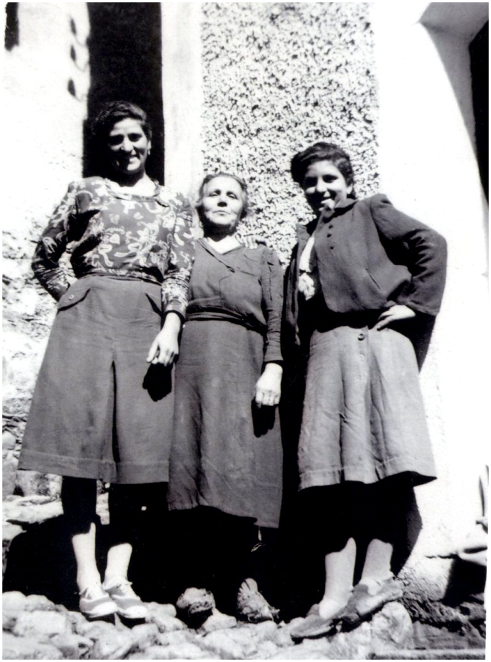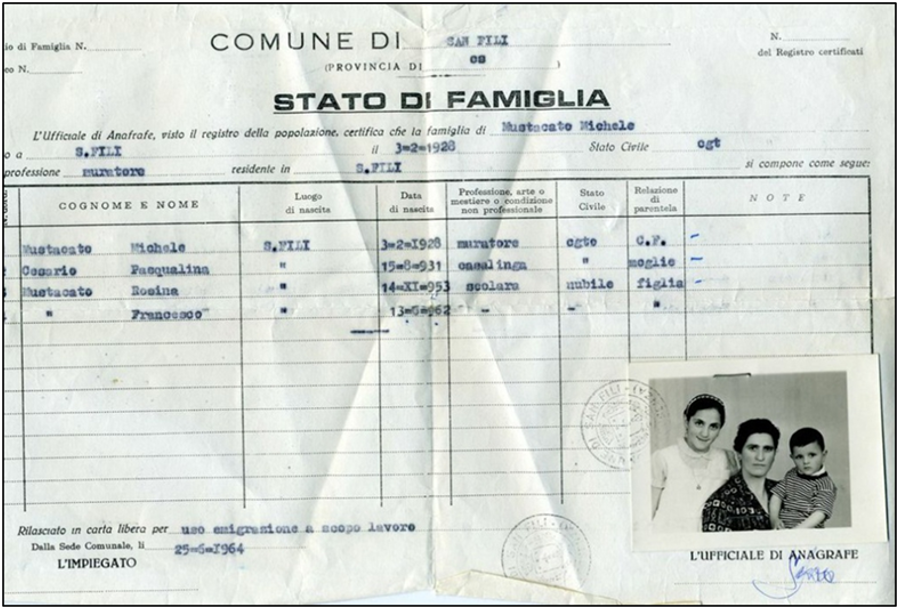As written by her daughter Sandra Mustacato
This past Mother’s Day, my nine year old son gave me a pair of running shoes. As I opened the gift and held the new running shoes in my hand, I had a flashback to a photograph of my own mother. The photograph was taken in the early 1950s, in Italy. At the time, she was a young woman and recently married to my father. She was posing with my grandmother and my aunt. I remember how happy and young she looked in this picture. But what caught my attention the most were the running shoes she wore. They contrasted greatly next to the sack like shoes my grandmother and aunt had on.

My mother, Pasqualina Cesario, was born in 1931 in a small town in Calabria called San Fili. Her family was poor and worked in the mountainous fields as farmers. She told me that those shoes were a gift from relatives in “America”. Gifts from America were cherished. She loved those shoes and kept them clean to ensure they would last and last. She wasn’t used to getting many gifts.
In this photo, my grandmother’s shoes are badly worn. This was post-war Italy and although the war was over, times were still very tough. Work and food were scarce. These women learned how to make do with what they had, and understood the word sacrifice to mean giving up part of your own dreams for the good of others.
From a very young age, my mother understood the necessity of sacrifice. She was the eldest daughter in a family of eight. In Grade 3, my grandmother withdrew her from school and kept her home to help look after her younger siblings, while her mother went to work in the fields.
Since Pasqualina was a girl, it was believed that she didn’t need an education. My mother was crushed. She loved school, but kept the disappointment to herself. She became the ‘master of the house’ at a very young age. She recalls watching her younger brothers while making supper for the whole family.
A young child herself, she had to sacrifice her own childhood for the good of the family. She understood this and accepted it without resentment, something I could not imagine doing.

Her sacrifices continued. She was 21 when she married my father, Michele Mustacato, and shortly after became pregnant with my oldest sister. My father, like so many Italian men, couldn’t find consistent work in Italy and convinced my mother it was time to leave their homeland, in search of a better life elsewhere. In 1954, they agreed to immigrate to Venezuela. My sister was only two years old when they began their immigration journey.
Upon arriving in Rome, my sister got sick with what they believed was the chickenpox. The immigration officers in Rome told my mother she and my sister could not go. My father had to go on without her. Heartbroken she understood what had to be done and said goodbye. For seven years my parents were separated.

My father worked in Venezuela and sent money back home for my mother and sister. My mother bought a house with this money, raised my sister on her own, and waited for the day that her husband would return. As my sister grew older, she remembers the advances some young men would make on my mother and how she stood up to them and turned them away.
Writing back and forth, she sent photos of my sister to my father and wrote letters, reminding him of their love. Seven years later, my father returned and my mother had her family back. She worked hard to help my sister get to know her father and to make up for the time lost.
My mother became pregnant again and had a son. Two years later, my father once again convinced my mother that it was time to leave Italy. Even after building a home, setting down roots and making it on her own for seven years, she would give it all up again and agree to leave. The local economy had not improved much and it was still difficult for her husband to find work. Farming provided food, but very little extra money to save for the future.
This time they wouldn’t be travelling by boat, instead they boarded an airplane for Toronto, Canada to join my aunt and uncle who had immigrated a few years earlier. In preparation for the journey, my mother saved her money and bought a special pair of patent leather shoes to wear to “America”.

Source: Courtesy of the Mustacato family.
Although she was poor, it was understood that you must make a “buona figura” (good impression) when you go someplace new. She said goodbye to her mother and siblings, closed up the house she had bought and packed up her few belongings in a trunk. Speaking no English, and with two children in tow, she made her sacrifice once again and came to Canada on September 4, 1964.
Living in Canada was hard. She left the privacy of her own home to live in a second floor rooming house shared with my aunt and uncle, and another family. While my father worked in construction during the day, my mother worked nightly at a local bakery washing dishes. She missed her home. She missed her life in Italy, but understood it was something that had to be done.
As the fall months turned to winter, my mother realized her life had changed. With the snowfall came the realization that this life would be very different. She looked down at the snow covering her patent leather shoes. With the few words she knew in English, she made her way to Bloor Street and walked into a shoe store. In broken English she said “bootsie” and made her first purchase a pair of Canadian winter boots. She quickly took off her patent leather shoes and put her feet into the warm boots, and realized she was home.

My mother and father settled in Toronto and purchased their first home on Marchmount Avenue. They had three more children after immigrating to Canada. My father found steady work in the construction industry and my mother devoted her life to raising her children. At the age of 50 she re-entered the workforce and took a job in a factory washing hospital linens.
Her life in Canada wasn’t easy but it was necessary. Like when she was a child, she often sacrificed her own happiness for the benefit of her family. Today, being called “Nonna” by twelve loving grandchildren, is her most rewarding accomplishment. Memories of the hardships experienced in adjusting to life in Canada fade when surrounded by family. To her, the sacrifices have all been worth it. And she has a closet full of shoes!

Source: Courtesy of the Mustacato family.
